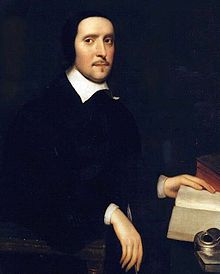"There was not in the first Churches an unity and universality of practice": Jeremy Taylor on things indifferent in the Sacraments
That the Symbols were to be consecrated, and who were to consecrate, and who were to receive, were of great necessity to be taught and determin'd: and in all this we see unity and necessity, authority and obedience; but when we goe beyond this and the plain & necessary & constituent parts of the institution we find variety and uncertainty. That bread is to be us'd is plain: but whether leavened or unleavened neither Christ nor his Apostles have left in charge or memory. That wine is to be bless'd is certain: but whether mingled with water or not mingled, we are not determined by any authority. That the bread and wine are to be bless'd we are sure: but in what form of words, and whether by the mystic prayer, or the words of institution, is not deriv'd to us by sufficient tradition. That the Lord's Supper is sacredly and with reverence to be receiv'd is taught us by the Apostles: but whether this reverence ought to be express'd by taking it fasting, or not fasting, the Apostles left the Churches to their choice ...
And the same is the case in Baptisme, in which that which was necessary is that the person be baptized in water, and in the name of the Father, Son and holy Ghost: but whether the Priest shall say, Ego te baptizo, as the Latins doe, or Baptizetur servus Christi, as the Greeks doe, is indifferent: and if the Apostles had us'd any other little variety of words, yet if there was not in the first Churches an unity and universality of practice, it is certain the Apostles did not by their act or Canon intend to oblige all Christendome; but themselves did it with liberty, and therefore so might the Churches after them.
For, excepting those things which the Apostles received from Christ in which they were ministers to all ages, once for all conveying the mind of Christ to the generations to come, in all other things they were but ordinary Ministers, to govern the Churches in their own times, and left all that ordinary power to their successors, with a power to rule their Churches, such as they had, and therefore what ever they conveyed as from Christ, a part of his doctrine or any thing of his appointment, this was to bind for ever; for Christ onely is our law-giver, and what he said, was to last for ever: in all things which he said not, the Apostles could not be law-givers, they had no such authority; and therefore whatsoever they order'd by their own wisdome, was to abide as long as the reason did abide; but still with the same liberty with which they appointed it; for of all men in the world they would least put a snare upon the Disciples, or tie fetters upon Christian liberty.




Comments
Post a Comment